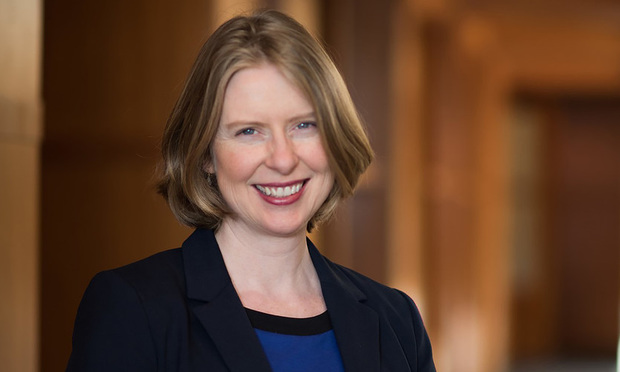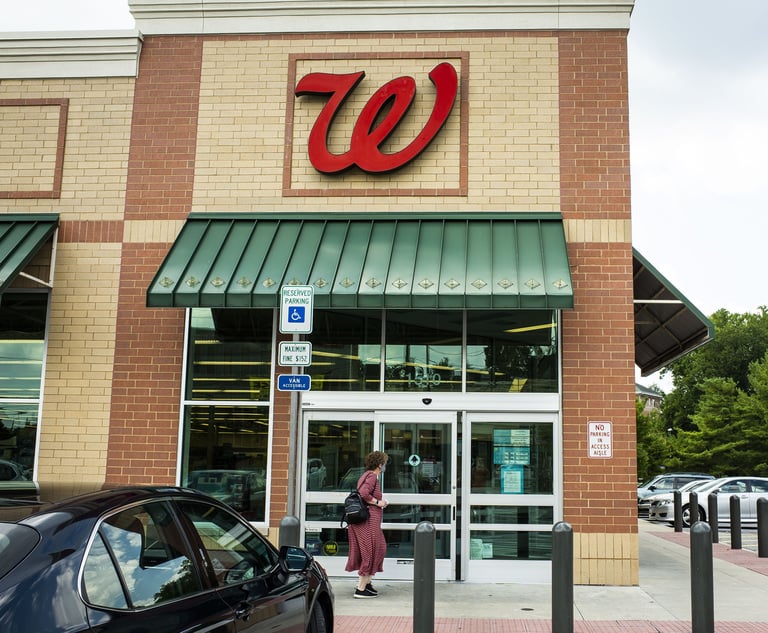Duke Law's Next Dean to Emphasize Tech, Innovation
Karen "Kerry" Abrams says law schools need to contemplate what the legal profession will look like in the next 50 years in order to produce in-demand graduates.
February 06, 2018 at 02:22 PM
4 minute read

The chance to lead an elite law school located in a tech hotbed was too good to pass up for Karen “Kerry” Abrams, incoming dean at Duke Law School.
The university on Feb. 2 announced the appointment of Abrams, who is currently a professor at the University of Virginia School of Law and vice provost for faculty affairs. On July 1 she will replace current Duke Dean David Levi, who is stepping down at the end of the academic year after 11 years in the position.
Abrams has been on the faculty at Virginia since 2005 and is an expert in family law and immigration law. We caught up with her this week to talk about her new gig, how technology is reshaping the legal profession and how elite law schools are faring in this tumultuous time for legal education. Her answers have been edited for length and clarity.
What appealed to you about the Duke Law deanship?
There is so much going on in the Research Triangle with technology and innovation. The Duke Law faculty are really strong in those areas, so it seemed like a really exciting opportunity that would fit my interests and skills. I was really impressed by the faculty, the students, the loyalty of the alumni, and the opportunity to be at a law school that's really integrated into a great university. And the location.
Tell me more about innovation. What do you think Duke Law is doing right in that area?
One thing they are doing really well is working with the local business and technology community through clinics and partnerships around entrepreneurship and technology. That's an area a lot of law schools have been slower to enter into. When I talk to practicing lawyers—especially those at large corporations—data security and data privacy is a big booming area of law. I think law schools in general have been a little behind to catch up to that. I think Duke is ahead of the game there and poised to be a real leader.
Do you think Duke, as an elite law school ranked No. 10 by U.S. News & World Report, is insulated from the larger economic pressures on legal education?
I don't think any school is insulated from the economic pressures. We're seeing the same changes in the legal profession that we're seeing across all industries. As work has become more global and more automated, some of the things people in various professions—including law—used to do no longer have to be done by humans. Some of them no longer have to be done by a human in that physical place. That means the nature of the work has changed, and also the number of jobs has contracted. All of the schools are reacting to that. Obviously the elite schools are in a different position in a contracting market, in that their students are still in high demand, but I think it would be misguided to think that any school—including the ones at the very top—are insulated completely. We all have to think about not just what does the profession look like now, but imagining what it might look like in 10, 20, 50 years.
What will be your priorities as dean?
I have a list of general areas I want to focus on: Support for faculty research and scholarship; taking advantage of the relationship of the university to promote cross-disciplinary work; really listening to our alumni and employers about the changing landscape of the legal profession and making sure students are being prepared to meet those challenges. Also, thinking about how to augment our public services profile as a school and how to leverage our clinics and public service programs to better serve the Durham community and an increasingly global public. I think the school is in really good shape. A lot of my first year is going to be spent listening and observing and trying to figure out what it's doing well.
What was it like at UVA and Charlottesville, Virginia, last fall during the white nationalist rally and the aftermath?
It was devastating. It was really difficult to have our community attacked in that way. The silver lining was that I think it forced all of us to think about our past as a university and as a city. And think about how we could do better going forward. But it was terrifying. I had people marching down my street, in front of my house, shouting really hateful things. I didn't think I would see that in my lifetime, up close.
This content has been archived. It is available through our partners, LexisNexis® and Bloomberg Law.
To view this content, please continue to their sites.
Not a Lexis Subscriber?
Subscribe Now
Not a Bloomberg Law Subscriber?
Subscribe Now
NOT FOR REPRINT
© 2025 ALM Global, LLC, All Rights Reserved. Request academic re-use from www.copyright.com. All other uses, submit a request to [email protected]. For more information visit Asset & Logo Licensing.
You Might Like
View All
12-Partner Team 'Surprises' Atlanta Firm’s Leaders With Exit to Launch New Reed Smith Office
4 minute read
Morgan Lewis Shutters Shenzhen Office Less Than Two Years After Launch

After Breakaway From FisherBroyles, Pierson Ferdinand Bills $75M in First Year
5 minute read
Judge Rejects Walgreens' Contractual Dispute Against Founder's Family Member
5 minute readTrending Stories
- 1'A Death Sentence for TikTok'?: Litigators and Experts Weigh Impact of Potential Ban on Creators and Data Privacy
- 2Bribery Case Against Former Lt. Gov. Brian Benjamin Is Dropped
- 3‘Extremely Disturbing’: AI Firms Face Class Action by ‘Taskers’ Exposed to Traumatic Content
- 4State Appeals Court Revives BraunHagey Lawsuit Alleging $4.2M Unlawful Wire to China
- 5Invoking Trump, AG Bonta Reminds Lawyers of Duties to Noncitizens in Plea Dealing
Who Got The Work
J. Brugh Lower of Gibbons has entered an appearance for industrial equipment supplier Devco Corporation in a pending trademark infringement lawsuit. The suit, accusing the defendant of selling knock-off Graco products, was filed Dec. 18 in New Jersey District Court by Rivkin Radler on behalf of Graco Inc. and Graco Minnesota. The case, assigned to U.S. District Judge Zahid N. Quraishi, is 3:24-cv-11294, Graco Inc. et al v. Devco Corporation.
Who Got The Work
Rebecca Maller-Stein and Kent A. Yalowitz of Arnold & Porter Kaye Scholer have entered their appearances for Hanaco Venture Capital and its executives, Lior Prosor and David Frankel, in a pending securities lawsuit. The action, filed on Dec. 24 in New York Southern District Court by Zell, Aron & Co. on behalf of Goldeneye Advisors, accuses the defendants of negligently and fraudulently managing the plaintiff's $1 million investment. The case, assigned to U.S. District Judge Vernon S. Broderick, is 1:24-cv-09918, Goldeneye Advisors, LLC v. Hanaco Venture Capital, Ltd. et al.
Who Got The Work
Attorneys from A&O Shearman has stepped in as defense counsel for Toronto-Dominion Bank and other defendants in a pending securities class action. The suit, filed Dec. 11 in New York Southern District Court by Bleichmar Fonti & Auld, accuses the defendants of concealing the bank's 'pervasive' deficiencies in regards to its compliance with the Bank Secrecy Act and the quality of its anti-money laundering controls. The case, assigned to U.S. District Judge Arun Subramanian, is 1:24-cv-09445, Gonzalez v. The Toronto-Dominion Bank et al.
Who Got The Work
Crown Castle International, a Pennsylvania company providing shared communications infrastructure, has turned to Luke D. Wolf of Gordon Rees Scully Mansukhani to fend off a pending breach-of-contract lawsuit. The court action, filed Nov. 25 in Michigan Eastern District Court by Hooper Hathaway PC on behalf of The Town Residences LLC, accuses Crown Castle of failing to transfer approximately $30,000 in utility payments from T-Mobile in breach of a roof-top lease and assignment agreement. The case, assigned to U.S. District Judge Susan K. Declercq, is 2:24-cv-13131, The Town Residences LLC v. T-Mobile US, Inc. et al.
Who Got The Work
Wilfred P. Coronato and Daniel M. Schwartz of McCarter & English have stepped in as defense counsel to Electrolux Home Products Inc. in a pending product liability lawsuit. The court action, filed Nov. 26 in New York Eastern District Court by Poulos Lopiccolo PC and Nagel Rice LLP on behalf of David Stern, alleges that the defendant's refrigerators’ drawers and shelving repeatedly break and fall apart within months after purchase. The case, assigned to U.S. District Judge Joan M. Azrack, is 2:24-cv-08204, Stern v. Electrolux Home Products, Inc.
Featured Firms
Law Offices of Gary Martin Hays & Associates, P.C.
(470) 294-1674
Law Offices of Mark E. Salomone
(857) 444-6468
Smith & Hassler
(713) 739-1250








